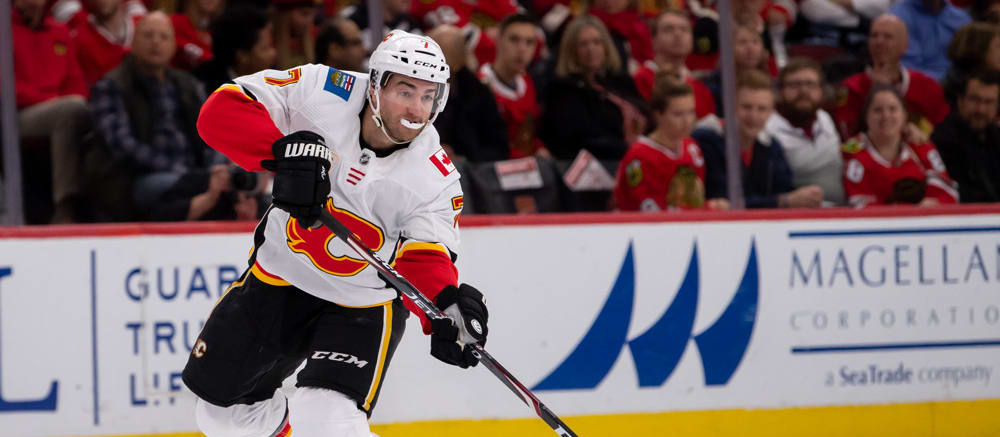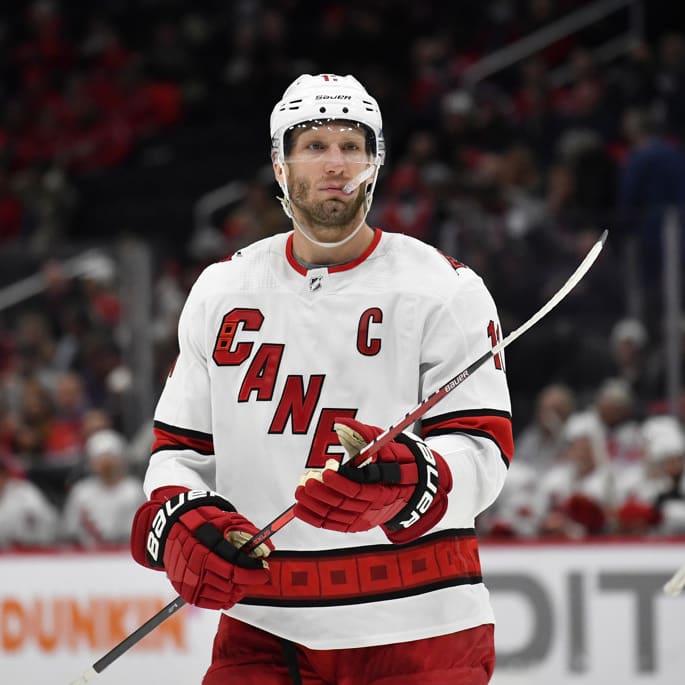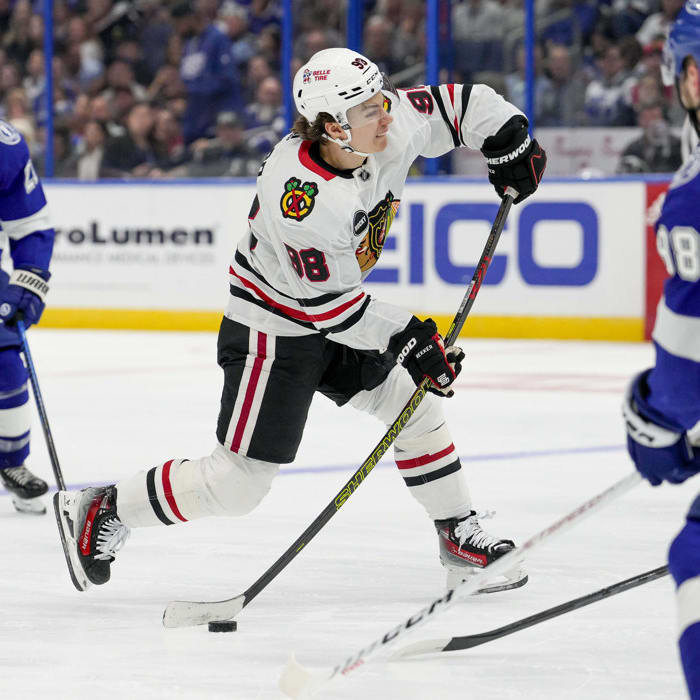This article is part of our Cap Compliance series.
While the current season remains on hiatus, there is no time like the present to start looking ahead to next year. Over the next several weeks, we'll take a look at the cap situation for all 31 NHL clubs, including restricted free agents, unrestricted free agents and even potential buyouts. Then, we'll play a little armchair General Manager by providing our recommendations for how we would approach the upcoming 2020-21 campaign if we were running the club.
In our third Twitter poll, the  Calgary Flames grabbed 25 percent of the vote and are at the plate.
Calgary Flames grabbed 25 percent of the vote and are at the plate.
2020-21 Cap Situation
The Flames currently have nine forwards, four defensemen and one goaltender under contract for next season at a price tag of $69,922,499, though the club will also be on the hook for buyouts of both Michael Stone and Troy Brouwer totaling $2,666,667. Assuming a flat cap of $81.5 million, this leaves the club with $16,910,834 in salary cap space and nine spots under the 23-man roster to fill.
Restricted Free Agents
Mark Jankowski ($1.675 million) Andrew Mangiapane ($715,000) Oliver Kylington ($730,833)
AJ Scholz: Starting with Kylington, the blueliner doesn't offer much in terms of offensive upside considering he's notched just 15 points in his 87 NHL contests. If the club wants to keep him around an extra year or two, it could consider a two-year, two-way contract worth $1.6 million that would offer slightly more than his qualifying offer ($787,500). Neither of the two forwards should expect anything more than a 2-3 year contract. Jankowski put together two solid campaigns after breaking into the NHL but has struggled this season with just seven points in 56 contests. His dip in production will likely prevent him from earning a hefty raise, so he'll probably sign something like a two-year, $3.6 million deal. In the case of Mangiapane, he is on a similar trajectory as Jankowski, just a year behind him. This season he set career highs in goals (17) and assists (15). I'd expect him to ink a two-year contract that retains his RFA rights at around $1.5 million annually.
Kyle Riley: The Flames currently have six defensemen on their roster that are set to become UFAs this summer, so re-signing Kylington should be considered essential. The 2015 second-round pick is a fantastic skater, and although his offensive skills have yet to translate to the NHL level, he's lit up the AHL in limited action over the past two seasons, racking up 10 goals and 17 points in just 21 games with Stockton. He isn't arbitration eligible, which means he won't be getting a big raise, but I think he'll stick with the big club throughout the 2020-21 campaign, so I'd be fine with inking him to a two-year, $2 million deal (one way). Jankowski's production fell off a cliff this year. He went from racking up 14 goals and 32 points in 79 games in 2018-19 to totaling just five goals and seven points in 56 games this campaign. The Flames would need to give him at least one year at $1.75 million to keep him around (his qualifying offer), so they should simply let him walk. Mangiapane will be looking for a big raise after notching 17 goals and 15 assists in 68 games this year, and rightfully so. The good thing is he's only making $715,000 this season, so I think AJ's right on the money with this one. A two-year, $3 million contract should get it done.
Unrestricted Free Agents
Tobias Rieder ($700,00) Zac Rinaldo ($700,000) T.J. Brodie ($4.65 million) Travis Hamonic ($3.9 million) Derek Forbort ($1.9 million) Erik Gustafsson ($1.2 million) Michael Stone ($700,000) Cam Talbot ($2.75 million) Austin Czarnik ($1.25 million)
AJ Scholz: Following the expiration of his previous two contracts, Rieder was not given a qualifying offer and allowed to walk in free agency, which is why he has found himself on his fourth team in just six NHL seasons. The 27-year-old forward was willing to take a minimal salary this past season to sign with the Flames, but he didn't provide much offensively (10 points in 55 outings) while logging the lowest ice time per game (11:05) of his career. At best, Rieder could hope for another one-year, two-way contract though I think the Flames would be best suited letting him walk. Rinaldo finds himself in a similar situation and figures to hit free agency, especially with youngsters like Glenn Gawdin and Matthew Phillips pushing for bigger roles. To round out the forward complement, the team already buried Austin Czarnik in the minors this season, so there is little chance he is brought back for another year. Talbot has been a serviceable backup for the Flames, however, with the cap as tight as it is, the organization may have to pursue other options. There figure to be a handful of veterans netminders available this offseason who could slot into the No. 2 role behind David Rittich including Thomas Greiss, Louis Domingue and Laurent Brossoit.
The defensive group is where the questions start to pile up with five different blueliners set to hit the free agent market. If the club needs to spend approximately $2 million for a veteran backup between the pipes, it will likely have to chose between Brodie and Hamonic. It will probably be injury concerns that sway the decision, as Hamonic has played 70-plus games in just four of his 10 NHL seasons, while Brodie missed that mark this year for the first time since the lockout shortened 2012-13 campaign. A four-year, $21 million contract would be on par with the extension signed by Jake Muzzin in February, who offers about the same level of offensive production. The remaining three defensemen are all comparable, defensively-minded players with similar offensive capabilities. Unless he is willing to take a paycut, Forbort is likely too expensive to retain. Depending on what sort of deal each is willing to accept, it's certainly possible to keep both Stone and Gustafsson, though I would prioritize Gustafsson. A three-year, $4.5 million contract sees the 28-year-old get both a raise and additional term and would leave them another $1-1.6 to commit to Stone as well. Whether they keep both likely depends on how the Flames feel about the development of Alexander Yelesin. After being bought out in August of 2019, Stone re-signed with the club in September on a minimal deal. He is still getting paid this season as part of that buyout, and could be willing to signed another one-year, $900,000 contract.
Kyle Riley: Rieder is an excellent skater and a solid penalty killer, so even though he doesn't put up many points, he's still a useful player. If he's willing to sign another one-year, two-way deal at the vet minimum, I wouldn't hesitate to keep him around for another season. Rinaldo, on the other hand, is pretty much only good for the rough stuff, and he's only appeared in 19 games this campaign, so I'd let him walk. As AJ mentioned, Czarnik has spent most of this season in the minors, so there's no way he'll be getting another deal with the Flames. Talbot has been solid as Calgary's No. 2 netminder this year, but Calgary can't afford to pay their backup $2.75 million annually, and he may be looking for a chance to be a starter again anyway. As AJ alluded to, there will be a handful of veteran goaltenders on the market this summer that will be looking for relatively cheap, one-year deals, so the Flames shouldn't have any trouble finding a replacement at a cost-effective rate.
Hamonic is a solid stay-at-home defenseman, but Brodie is a far superior two-way player, so although he's having a bit of a down year from an offensive standpoint, I'd definitely prioritize re-signing him. Muzzin is a fair comparison, but Brodie's two years younger, so he'll be wanting a bit more than the four-year, $21 million extension Muzzin signed with the Maple Leafs. I'd be willing to bump that up to four years and $24 million ($6 million AAV) to keep Brodie in Calgary. As AJ said, the Flames can really only afford to sign one of Brodie and Hamonic, so this scenario would see Hamonic heading elsewhere in free agency. Forbort and Gustafsson are almost certainly going to be looking for more than Calgary can afford, so I think the team would be wise to simply chalk them up as pure rentals and let them sign elsewhere this summer. Stone, on the other hand, is a solid depth option that won't be looking for much, so I wouldn't hesitate to give him another year at the league minimum. Although he's missed the entirety of this season due to a knee injury, Juuso Valimaki should be ready to take on a full-time role with the big club next season, which will soften the blow of losing Hamonic, Forbort and Gustafsson in free agency.
Minor-League Free Agents *Who appeared in an NHL game in 2019-20
Buddy Robinson ($700,000) Alan Quine ($735,000)
AJ Scholz: The organization knows what it has in Quine, a fringe NHL player who won't offer much more than bottom-six depth. He's logged 106 games for the Islanders and Flames in which he's registered 10 goals, 18 helpers and 125 shots while averaging 11:52 of ice time. The center did finish second in scoring for AHL Stockton (46 points in 38 appearances), but that likely isn't enough to warrant keeping him around. For Robinson, he hasn't had more than a cup of coffee at the NHL level (12 games). As such, team brass might be willing to give him a one-year, two-way prove it contract worth $800,000 to see if he can make it work.
Kyle Riley: Quine is an elite AHLer and a fringe NHLer, so if he's willing to stick around on a cheap two-way deal, sure, why not? If not, the Flames should let him walk. Robinson's in the same boat, so I'd take the same approach with his contract negotiations.
Final Thoughts
AJ Scholz: Of all the available options for the Flames to sign in the crease this offseason, I actually think Brian Elliott might make the perfect fit. He's not as old as Mike Smith or Jimmy Howard and proved himself a capable fill in this season when Carter Hart was injured. If the team can bring in somebody, whether it be Talbot or not, at a cost-effective price point, they might just have enough to upgrade their bottom-six forward complement as well. While there are no doubt people who would like to see Milan Lucic's contract bought out, due to the term and the fact that it's a retained salary contract, the financial side of it makes little sense. At best, the club would save $500,000 in cap space this season, which wouldn't even be enough to slot in a replacement player. Unless they can convince another team to take on his contract and general lack of production, he's not going anywhere anytime soon.
Kyle Riley: With the plan I outlined above, the Flames would have around $6.5 million in cap space to play with this offseason. That should be enough for them to sign a reliable veteran backup netminder, bring up a couple of their promising youngsters and add a complementary piece or two to round out their already talented roster.












